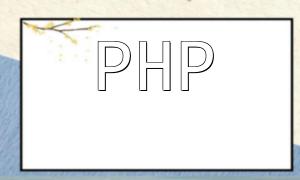In PHP development, writing clean and elegant code is crucial for improving code quality and maintainability. This article will explore several best practices to help developers write high-quality PHP code, enhancing project readability and maintainability.
In a project, different developers may have vastly different coding styles, which can pose a significant challenge for code readability and maintenance. Therefore, it is essential to establish and follow unified coding standards. In the PHP community, PSR (PHP Standards Recommendations) is a widely accepted coding standard, and we can follow PSR-1 and PSR-12 to guide our coding practices.
// PSR-1
<?php
namespace VendorPackage;
class ClassName
{
const CONFIG = 'config';
private $property;
public function __construct()
{
$this->property = 'value';
}
public function getProperty()
{
return $this->property;
}
}
// PSR-12
<?php
namespace VendorPackage;
class ClassName
{
private $property;
public function __construct()
{
$this->property = 'value';
}
public function getProperty(): string
{
return $this->property;
}
}
Using meaningful and clear names can significantly improve code readability. Names should reflect the purpose of variables, functions, and classes, and they should follow camelCase naming conventions. Additionally, avoid abbreviations and use English words instead of pinyin when naming.
// Bad Naming
$a = 20; // unclear variable name
$b = calculate($a, 10); // function name doesn't reflect its purpose
class user { } // class name starts with lowercase letter
// Good Naming
$age = 20; // clear variable name
$result = calculateAge($age, 10); // function name reflects its purpose
class User { } // class name starts with uppercase letter
Comments are an essential part of code. They explain the purpose and logic of the code, helping other developers understand it. However, excessive comments can clutter the code. Therefore, comments should be used wisely, added only when necessary, and be brief and easy to understand.
function calculate($a, $b)
{
// This is the logic for calculating the result
$result = $a + $b;
return $result;
}
Global variables can increase code complexity and unpredictability. To avoid the excessive use of global variables, limit the scope of variables to where they are needed. You can use static members in classes or dependency injection to replace global variables.
// Bad Practice
$counter = 0;
function incrementCounter()
{
global $counter;
$counter++;
}
// Good Practice
class Counter
{
private static $counter = 0;
public static function increment()
{
self::$counter++;
}
}
Proper error and exception handling is critical for ensuring code stability and reliability. Errors and exceptions that may occur in the code should be caught and handled to avoid program crashes or exposure of sensitive information. For fatal errors, you can use try-catch statements to catch exceptions and handle them appropriately.
try {
// Execute code that might throw errors
} catch (Exception $e) {
// Handle the exception and perform appropriate actions
}
By adhering to unified coding standards, good naming conventions, proper use of comments, avoiding the overuse of global variables, and correctly handling errors and exceptions, we can write clean and elegant PHP code. Such code is not only easier to read and maintain but also enhances the quality and reliability of projects, laying a solid foundation for long-term development. Only through continuous learning and practice can we become exceptional PHP developers.









